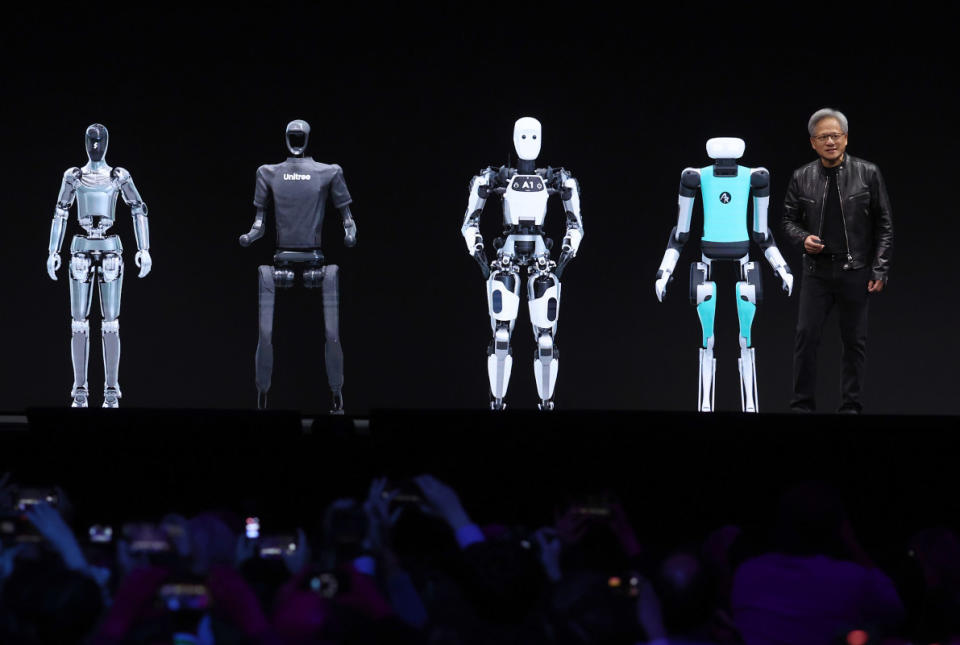Two things 60 Minutes taught us about Nvidia's Jensen Huang
Nvidia CEO Jensen Huang was the focus of a 60 Minutes profile on Sunday night. And we learned a few things about the boss of the hottest chip company around.
The profile used the company's mid-March GTC confab in San Jose to anchor the profile of Huang, who co-founded the company in 1993 with fellow semiconductor designers Chris Malachowsky and Curtis Priem.
Related: Want interest rate cuts this year? Too bad
Huang seemed to glide smoothly and amiably around the event, held at SAP Center in San Jose, Calif. He posed for pictures with fans, shook hands with others.
He seamlessly handled a multihour keynote address that demonstrated products that use Nvidia (NVDA) products. And he offered glimpses of what its hot new Blackwell family of graphics processing units — GPUs — which will be able to handle quadrillions of calculations per second.
"It's insane," he allowed to CBS correspondent Bill Whitaker.
As smooth as he is and as successful as his conference was, he did offer two views of himself you don't normally expect.
Here's the first.
The boss gets the willies in front of crowds
Despite extensive planning and rehearsing for the conference, Huang said he was still scared when he went on stage and faced the 18,000-strong crowd in the arena and thousands more online.
"I still am," he told Whitaker.
Huang, Malachowsky and Priem founded Nvidia at a back table at a Denny's restaurant in San Jose. All three had been chip designers in Silicon Valley and didn't have too much money to start their company.
Two products they tried to sell didn't succeed at all, and their business looked as if it would go nowhere.
More AI Stocks:
Analyst unveils eye-popping Palantir stock price target after Oracle deal
Analysts revamp Microsoft stock price target amid OpenAI reports
But they were able to persuade some gaming companies to buy their chip ideas. And Microsoft (MSFT) added their chips in its Xbox game console.
The trio, to their surprise, had found an addressable market for their chips in computer games. And it grew quickly.
In time, people interested in developing artificial intelligence found the gaming chips could work in their work, too.

Justin Sullivan/Getty Images
As nice as he seems in public settings, Whitaker found Huang quite intense in actual meeting settings.
Several employees described him as demanding, not easy to work for and a perfectionist.
Huang was a touch surprised, but he didn't disagree, adding, "If you want to do extraordinary things, it shouldn't be easy."
Related: Nvidia set to capture billions as big tech boosts AI spending
Nvidia shares have had an extraordinary run.
The shares jumped 239% in 2023. They closed Friday at $877.35, up 6.2%. And they have leaped 77% this year — even after a 7.65% decline from their peak close of $950.02 on March 25.
Here's the second thing we learned from 60 minutes.
Sometimes AI scares Huang, too
He did not dismiss the concerns of critics who believe artificial intelligence could take over human thought and somehow pose a threat to humanity.
Fake videos and fake speeches are already rampant, Whitaker said. He gets the "gee whiz" aspect of AI. It's the other vague threats AI could pose to us.
"You're feeling the right feelings," he told Whitaker. "I feel them, too."
But Huang was optimistic that AI will lead to progress and prosperity.
"We can only hope he's right," Whitaker said.
Related: Veteran fund manager picks favorite stocks for 2024
